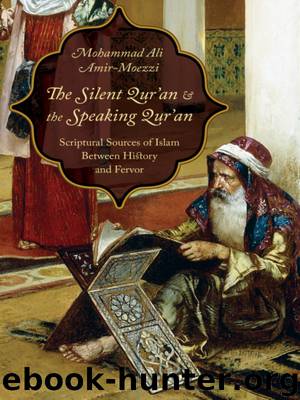The Silent Qur'an and the Speaking Qur'an by Mohammad Ali Amir-Moezzi

Author:Mohammad Ali Amir-Moezzi
Language: eng
Format: epub
Tags: REL041000, Religion/Islam/Koran & Sacred Writings, REL037010, Religion/Islam/History
Publisher: Columbia University Press
Published: 2016-01-04T16:00:00+00:00
HIS RANK AMONG THE IMAMIS
As a result of his compilation of the Kitāb al-Kāfī, Shaykh al-Kulaynī always enjoyed great respect among Imami scholars, and as much in Baghdad as in his homeland of Rayy, a respect that lasted during his own lifetime as well as later up to the present day. Al-Najāshī, the major expert of Shi’ite prosopography, presents him as the master of the Imamis and the outstanding figure in the city of Rayy during his lifetime (shaykh aṣḥābinā fī waqtihi bi’l-Rayy wa-wajhuhum).186 He adds that al-Kulaynī was both the most trustworthy and the most rigorous of traditionists with respect to the collection and attribution of hadiths (kāna awthaq al-nās fī’l-ḥadīth wa-athbatahum). Al-Najāshī’s estimation was doubtless based on analysis of the text of the Kāfī as well as our scholar’s other works. Shaykh al-Ṭūsī also emphasizes the supreme scientific rank and trustworthiness of al-Kulaynī and places great weight on his knowledge of hadiths (thiqa ʿārif bi’l-akhbār/jalīl al-qadr ʿālim bi’l-akhbār).187 Other Imami traditionists and scholars have also praised him in more or less similar terms as “the truthful master” (al-shaykh al-ṣadūq) or “the master whose reliability and soundness are unanimously accorded” (al-shaykh al-muttafaq ʿalā thiqatihi wa-amānatihi). ʿAlī b. Ṭāwūs (d. 664/1266), with his traditionalist leanings,188 is one of the most laudatory with respect to our author.189 Al-Muḥaqqiq ʿAlī al-Karakī (d. 940/1534), the famous shaykh al-islām of the Safavid Shah Ṭahmāsb, calls al-Kulaynī “the gatherer of the traditions of the Prophet’s Family” (jāmiʿ aḥādīth ahl al-bayt).190 Zayn al-Dīn b. ʿAlī, the second martyr (d. 965/1558), also calls him “the master of the group (of Imamis)” (shaykh al-ṭā’ifa/ra’īs al-madhhab).191 The shaykh al-Ḥusayn b. ʿAbd al-Ṣamad (d. 984/1576) acknowledges al-Kulaynī as the greatest scholar of the science of Hadith among traditionists and the most rigorous of critics in this discipline.192 Muḥammad Taqī al-Majlisī (d. 1070/1660), the father of the famous al-Majlisī, author of the Biḥār, considers our author a scholar directly supported (mu’ayyad) by God.193 Muḥammad Bāqir, his son, states that al-Kulaynī is accepted by the entire body of scholars, both Shi’ite and Sunni.194 Unsurprisingly, al-Kulaynī is particularly esteemed by traditionalist (Akhbārī) scholars.195 As is well known, he has been called by them “the chief of the traditionists” (ra’īs al-muḥaddithīn).196 Mullā Ṣadrā (d. 1050/1640), the great philosopher of the Safavid period, admired al-Kulaynī and was easily the most renowned of his commentators.197 In more recent times, praise of our man has resumed afresh.198 In some Imami sources he is even called “the propagator of Imami Shi’ite doctrine during the Occultation” or even “the great traditionist” (al-ḥāfiẓ).199 Al-Kulaynī’s exalted position among Imamis has even been stressed by Sunni authors, who at times have termed him “the learned jurist” (al-faqīh).200 According to a famous prophetic tradition, Islam has a “renewer” (mujaddid) in every century;201 this is why, in passing from one century of the Hijra to another, a number of the most influential scholars have been upheld as the “revivers” of the time. In his Jāmiʿ al-uṣūl, in a list of scholars who fall into this category, the Sunni writer Ibn al-Athīr (d.
Download
This site does not store any files on its server. We only index and link to content provided by other sites. Please contact the content providers to delete copyright contents if any and email us, we'll remove relevant links or contents immediately.
The History of Jihad: From Muhammad to ISIS by Spencer Robert(2621)
Nine Parts of Desire by Geraldine Brooks(2361)
The Turkish Psychedelic Explosion by Daniel Spicer(2355)
The First Muslim The Story of Muhammad by Lesley Hazleton(2268)
The Essential Rumi by Coleman Barks(2043)
1453 by Roger Crowley(2023)
The Last Mughal by William Dalrymple(1855)
Trickster Travels: A Sixteenth-Century Muslim Between Worlds by Davis Natalie Zemon(1847)
Muhammad: His Life Based on the Earliest Sources by Martin Lings(1644)
God by Aslan Reza(1639)
by Christianity & Islam(1628)
A Concise History of Sunnis and Shi'is by John McHugo(1567)
No God But God by Reza Aslan(1540)
Magic and Divination in Early Islam by Emilie Savage-Smith;(1533)
The Flight of the Intellectuals by Berman Paul(1501)
Nothing to Envy by Barbara Demick(1445)
Art of Betrayal by Gordon Corera(1429)
What the Qur'an Meant by Garry Wills(1391)
Getting Jesus Right: How Muslims Get Jesus and Islam Wrong by James A Beverley & Craig A Evans(1340)
